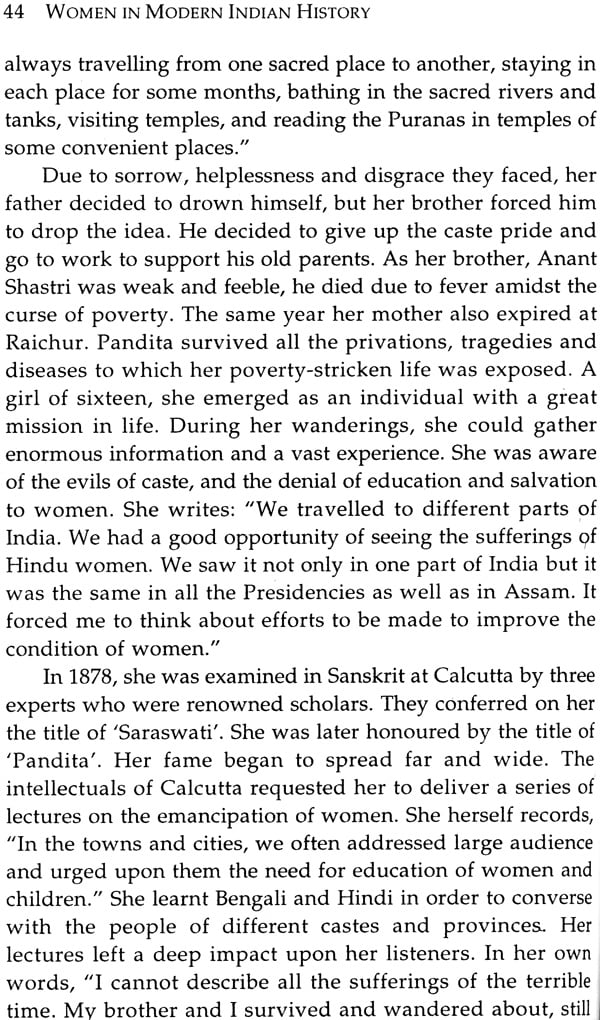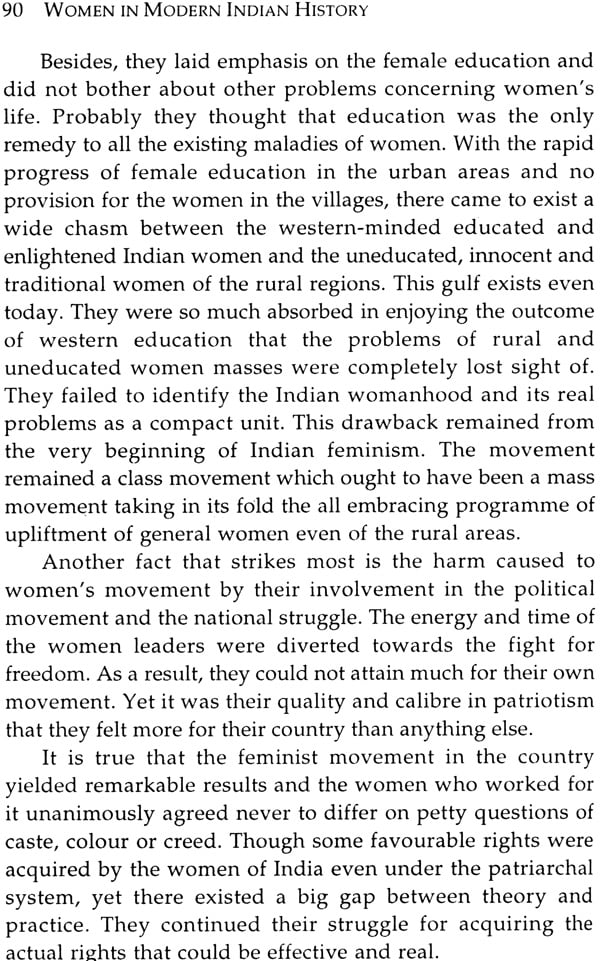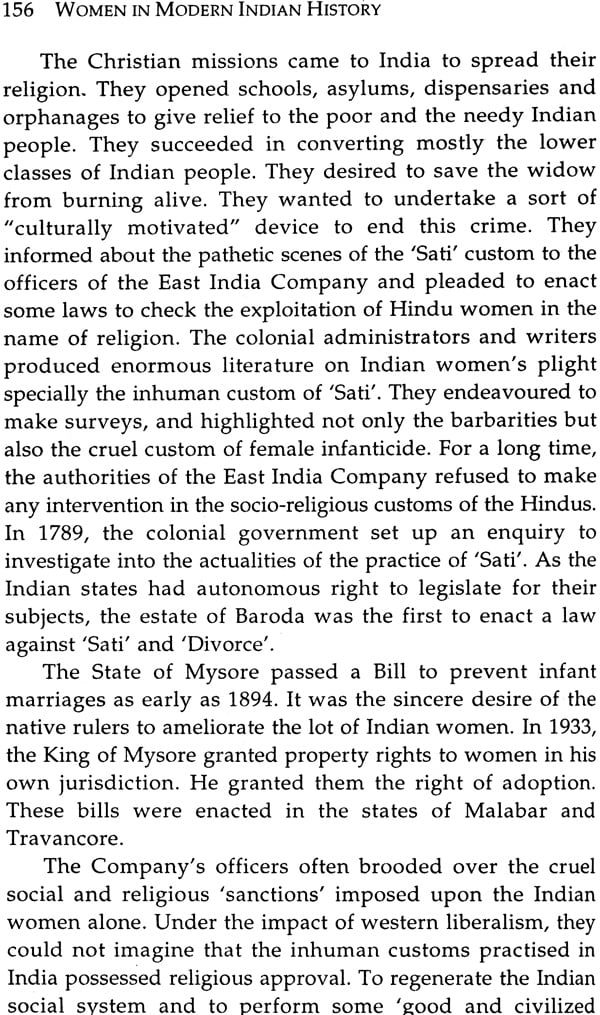
Women in Modern Indian History
Book Specification
| Item Code: | NAK175 |
| Author: | Sugam Anand |
| Publisher: | Anamika Publishers & Distributor (P) Ltd. |
| Language: | English |
| Edition: | 2010 |
| ISBN: | 9788179753958 |
| Pages: | 231 |
| Cover: | Paperback |
| Other Details | 8.5 inch x 5.5 inch |
| Weight | 220 gm |
Book Description
Women in Modern Indian History delineates the story of Indian womanhood after the renaissance of the 19th century. He traces the influence of the new education upon the cribbed and cabined' woman in Indian society Prof. Anand tells us about the changes in attitude and aptitude of urban women. The awakening of the modern India women was not only amazing but also satisfying as the men reformers attempted to ameliorate their socio- economic lot, Rammohun Roy began the crusade against the practice of Sati. In 1892, the British enacted the Sati Abolition Act. Many others took up the women's issues and helped the British to pass legal enactments for the socially crippled women of India. Labour organisations came into existence to facilitate the working class women in industries, mines and factories.
Prof. Anand feels that the new liberal ideas brought a metamorphosis among the women who themselves felt the need for their own resurgence. They realized that they must come forward to complete the task of their own individual freedom and identity. They formed their own organisations like. All India women's Conference, Women's Indian Association and University Council of women, etc. they put forward their demand for total emancipation and equality. They joined different respectable professions and became self reliant. They joined the national movement with patriotic fervour and emotive sentiments. Their valour and courage were acknowledged by the people at large.
Prof. Anand concludes that women in modern Indian aspired to revive their glorious position of Rigvedic India. They did not ape the Western style and aspirations. They gave value to indigenous ideals and cultural specialities. He critically examines the efforts of women stalwarts who gave direction to the general women. In every walk of life, Indian women excelled exceptionally well and set an example of service. They have broken the barriers and glass ceilings and came out victorious in almost all arenas i.e. social work to space, politics, sports, entertainment, literature, technology.
Renowned historian and author of several books, Dr. Sugam Anand is Professor in the Department of History and Culture, Dr. B.R. Ambedkas University Agra. He is also the Dean of the Faculty of Arts and Dean of the foreign Affairs and Research in the University. He was Head of the Department in the University from 2003 to 2008. His primary field of research has been medieval and modern Indian History. He completed his Ph.D. on the Mughal Empress Nurjahan Begum in 1988. He successfully attained D. Litt. Of Dr. B. R Ambedkar University on the topic Socio-Religious Thought of Fifteenth Century north India'. His other published works include Modern Indian Historiography From Pillai to Azad and Modern Indian Historiography Since Independence (co-author).
A true seeker and researcher he loves to enter new fields in History and Culture. Prof. Anand has to his credit more than 30 research articles published in journals of repute. He has presented papers at various seminars and conferences. He recently became the President of the Medieval Section of the U.P History Congress.
Prof. Anand has recently turned his attention to women's history. His book in Hindi Bharatiya itibas Men Naari has won the prestigious award by the U.P Hindi Sansthan, Lucknow.
The present work entitled women in Modern Indian History is the outcome of my curiosity and sincere efforts to study and understand the aspirations and determinations of the modern Indian women. They made efforts to change their socio-economic status and position in the light of the new liberal currents of the 19th century renaissance. Their gradual development began with logical thoughts of the reformers and social thinkers who felt that for the attainment of freedom and self-government in the country, the women must be liberated enough to shoulder the new responsibilities in free India. Wonder welcomed the fresh fragrance of the new education and readily absorbed it in their lifestyle and other social ends. The outworn traditions were willingly discarded by them, especially in the urban regions. They emerged as individuals "nationally important and socially useful." They daringly crossed every hurdle on their way to their emancipation. They swiftly marched ahead on the road to plenty, progress, and prosperity for themselves as well as for their nation.
My intense study of women's history began a few years back. My recent book Bhartiya Itihas Mein Nari won a prestigious award from Uttar Pradesh Hindi Sansthan, Luckhnow. It certainly gave to me enough incentive to explore further the gender history of India. My Ph.D. thesis entitled History of Empress Nurjajan Begum had been related to this field. It was published in 2001. I have translated my mother's book Social Transformation of U.P. Women', which she completed as an S.R.F. Project of I.C.H.R., New Delhi. All this provided me with lot of opportunities to enlarge the panorama of my study of Indian feminism and socio economic status of women in modern India. I found that Indian feminism was quite different from the feminist movements of others countries.
Modern Indian women are educated cultured and self-reliant, yet they stick to the age-old ideas and values of life. The western concepts of feminism did not appeal to them the Indian government attempted not only to enact legal reforms for their upliftment but also made it a practical reality. The women of rural India have sincerely worked in different fields of life. They work in the agricultural sectors and cottage industries. Modern Indian women are working in large numbers in different fields of life. They work in the agricultural sectors an cottage industries. Modern Indian women are working in large number in different respectable profession. Women's role in the national struggle as well as their participation in the reconstruction of the country has really been amazing. They have distinguished themselves in all walk of life. The story of their regeneration and their participation in the task of nation building has been specially taken up in the present work.
I am obliged to my mother Prof. Pratima Asthana, who has been a pioneer in research and writing, in the field of gender history. Besides research and writing, she has also worked through many organizations for the cause of womens' upliftment. I am also grateful to all those who have contributed to women's history and brought to light the contribution of modern Indian women in a new setting and University for his ready help and advice.
I humbly dedicate this book to the Holy Feet of the Almighty who showered his special grace on me to complete this project, despite all my pre-occupations in the University programmes and academic projects.
| Preface | 7 | |
| 1 | Looking Back | 9 |
| 2 | The Dawn | 21 |
| 3 | Reformers' Zeal | 30 |
| 4 | The Germination | 42 |
| 5 | The Horizon Expands | 62 |
| 6 | Towards Fulfilment | 91 |
| 7 | In Politics | 116 |
| 8 | Education and Career | 137 |
| 9 | Legal Enactments | 155 |
| 10 | The Excellence | 181 |
| 11 | Conclusion | 206 |
| Index | 219 |








